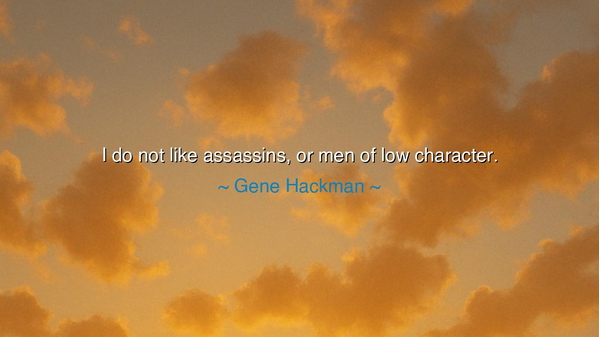
I do not like assassins, or men of low character.






Hear the words of Gene Hackman, spoken with the weight of simplicity and truth: “I do not like assassins, or men of low character.” Though the words are plain, they carry the strength of a moral law, for they cut to the heart of honor. The assassin is not merely a killer, but a destroyer of trust, one who strikes from the shadows and rends the bonds of fellowship. The man of low character, though he may not wield a blade, corrupts the world in quieter ways—through deceit, betrayal, and cowardice. Hackman’s words remind us that such men, whether violent or base, poison the fabric of human community.
The origin of this sentiment lies deep in the traditions of justice and virtue. In the ancient world, to call one an assassin was to brand him dishonorable, for he struck not in the open field of battle but in secret, betraying trust. The Greeks told of Clytemnestra, who slew her husband Agamemnon not in war, but in his own hall, in the guise of welcome. Her act was condemned not only for bloodshed, but for its treachery. So too, the Romans loathed those who wielded daggers in the dark, for assassination undermined the sacred order of public life. Hackman’s words echo this timeless disdain for betrayal and dishonor.
History is filled with examples of how assassins and men of low character bring ruin. Consider the murder of Julius Caesar by those he called friends. Brutus and the others justified their act as a defense of liberty, yet history remembers the treachery more than the cause. Rome descended into chaos, and what they hoped to preserve was lost. Their daggers bought not freedom but empire. Thus we see: when men of low character take matters into their own hands, they unleash storms that consume more than they intend.
Yet Hackman’s words do not condemn only assassins of body—they also condemn assassins of spirit. For there are those who kill not with steel, but with lies, with slander, with selfishness. A man of low character may smile and shake hands, yet within, he plots his own gain. He does not strike swiftly like the assassin, but corrodes slowly, like rust upon iron. In the end, the destruction is the same. A people who tolerate such men are a people whose foundation will crumble.
But let us not despair, for these words also point us toward the path of strength. If we despise assassins and men of low character, we must strive instead to be men and women of honor. The warrior who fights openly, the leader who speaks truth even when it costs him, the friend who remains loyal in hardship—these are the ones who uphold the world. Greatness is not found in secret violence or low cunning, but in courage, steadfastness, and integrity.
Consider Abraham Lincoln, who in the midst of civil war was surrounded by hatred, schemes, and threats. He could have silenced critics with cruelty or governed by fear. Instead, he carried himself with dignity, humility, and mercy. Even in victory, he sought reconciliation, not revenge. He was slain by an assassin’s bullet, but his character shines brighter than the darkness of that act. His legacy endures not because he was spared from treachery, but because he lived in opposition to it, embodying honor in a world filled with betrayal.
The lesson, therefore, is clear: guard your life against both forms of corruption. Be neither assassin nor man of low character. Do not strike from shadows, nor live in deceit. Instead, let your actions be open, your words sincere, your heart steady. Build a life that others may trust, for trust is the soil in which all community grows. If you must fight, fight with honor. If you must speak, speak with truth. Let your character be high, not low, and your life will stand as a fortress against treachery.
So I counsel you: remember Hackman’s words. Shun the path of the assassin, reject the way of the corrupt. Walk instead in the way of honor, for though it may be harder, it leads to lasting peace. The assassin dies with his blade, the man of low character rots in memory, but the one of integrity endures in the hearts of generations. Despise betrayal. Embrace honor. Live with character that will outlast the grave.






AAdministratorAdministrator
Welcome, honored guests. Please leave a comment, we will respond soon